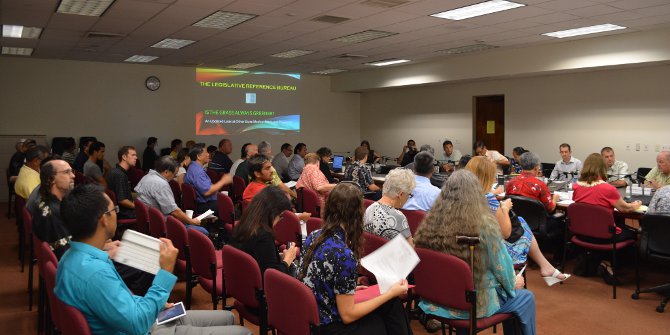 Do the biggest industries control the political and policy agenda across the U.S.? Despite the general sentiment that they often do, Mark Ritchey argues that small interest groups can win out against big industry in influencing government policy. Using the example of autism advocacy groups in the late 2000s and early 2010s, he writes that these groups were able to take advantage of state ‘Blue Ribbon’ policy taskforces to influence some of them to recommend that state law makers mandate private insurance coverage for autism therapy. This in turn, increased the likelihood that such legislation would be adopted by state lawmakers.
Do the biggest industries control the political and policy agenda across the U.S.? Despite the general sentiment that they often do, Mark Ritchey argues that small interest groups can win out against big industry in influencing government policy. Using the example of autism advocacy groups in the late 2000s and early 2010s, he writes that these groups were able to take advantage of state ‘Blue Ribbon’ policy taskforces to influence some of them to recommend that state law makers mandate private insurance coverage for autism therapy. This in turn, increased the likelihood that such legislation would be adopted by state lawmakers.
The current sentiment in American politics is that large industries have control of the agenda. Many believe the days of the common man conquering the corporate boss are a thing of the past, and the barrage of media stories highlighting the millions of dollars big business gives to political candidates helps create this growing cynicism towards politics. However, recently, a seemingly powerless group of special interests appeared powerful against the health insurance industry.
During the early 2000s, autism increasingly became a problem facing thousands of families in the United States. Advocacy groups even claimed that autism was nearing epidemic proportions. This resulted in high medical and treatment costs for those families affected by autism. In 2001, the state of Indiana passed a law that mandated health insurance companies to not only cover medical expenses, but also therapeutic costs such as occupational, speech, and other rehabilitative services associated with the treatment of autism to alleviate this financial burden. It was unheard of at the time to compel a health insurance company to pay for services that were not purely medical.
Unsurprisingly, the health insurance companies fought for several years in other states to keep the insurance mandate off the agenda because of the high cost associated with therapeutic services offered to those suffering from autism. Nevertheless, from 2008 to 2013, 23 other states passed a bill similar to the one enacted in Indiana. What caused this flurry of states to adopt legislation forcing insurance companies to pay for rehabilitative services for those with autism?
The answer in part may be attributed to a relatively nascent and weak set of interest groups led by Autism Speaks (AS) and the Autism Society of America (ASA) utilizing an often-overlooked political venue. The venue in question is a special commission often called a policy task force. Governors and state legislatures often form task forces to examine certain policies and offer their recommendations at the conclusion of their investigation. The vast majority of these task forces are never heard from again once they are formed. However, in the autism case they proved to be a valuable tool for those who were proponents of the insurance mandate.
ASA is the largest grassroots organization with local chapters spread throughout the United States devoted to providing resources for parents of autistic children. These resources include basic support, assistance locating therapists in the area as well as professionals such as dentists and hairstylists who can provide basic services to autistic children. The organization works to keep members up to date on all autism legislation through their local chapters, newsletters, magazines, and email campaigns.
While the ASA is the oldest and largest autism-related group, AS was founded in 2005, by the vice chairman of General Electric, who has a grandson with autism. Their primary goal was to ensure the passage of insurance mandates in all 50 states.

These two groups had an uphill battle on their hands if they were going to succeed in convincing states to pass the insurance mandate bill considering that between 2001 and 2010 the health insurance industry donated approximately $42 million to legislative and executive candidates in the American states. Thus, their influence was well established among the ranks of politicians. The question remains how did ASA and AS defeat the mighty health insurance companies in nearly half the American states?
There are two stages where groups can influence policy task forces. First, they can either promote or deter their formation. In the case of autism, the health insurance industry desperately wanted to stop the development of these groups. Consequently, in states where insurers donate the most to candidates, only 20 percent created a task force. Alternatively, 50 percent of those states where the insurance industry was weakest did so as well. Unfortunately, for ASA and AS, they were not powerful enough to promote the formation of these task forces.
Despite ASA’s and AS’s apparent weakness in the formation stage they were able to exert some influence during the recommendation phase, when the state forms the task force and groups are able to present their viewpoints to the commission. Thus, in states with a high number of autism groups, 45 percent of task forces recommended that lawmakers mandate private insurance coverage for autism therapy. In those states with low autism group strength that formed task forces, not one of those commissions recommended a mandate. Once again, the health insurance industry proved to be a formidable opponent in that no task forces recommended passing a mandate in states where the industry gave generously to politicians.
Once the task force concludes their inquest they then pass their recommendation on to lawmakers. In the autism case their recommendation proved vital in the passage of the insurance mandate. Specifically task forces that made a recommendation increased the likelihood of adoption by 120 percent. Contrary to conventional wisdom, interest groups during the adoption stage did not have any impact on lawmakers’ decisions if the task force recommendation was present. Thus, both the autism and insurance groups had no impact at the adoption stage.
My findings suggest several things. First, policy task forces are greatly understudied. Traditionally, task forces are merely seen as symbolic gestures to appease the masses that politicians are doing something to address a problem. However, in the case of the autism insurance bill they played an important role in the policy making process. Secondly, this study illustrates that smaller groups can persuade task forces to see their point of view. However, their impact wasn’t nearly as strong as the traditional business influence. Yet, this research does illustrate that small groups do have another political venue to participate in to influence lawmakers to pass their initiatives. Recall in this case that ASA and AS defeated the health insurance industry in nearly half the states. If these groups did not take advantage of presenting their concerns to autism policy taskforces then it is very likely these groups would not have been as successful. Certainly, more research is required to ascertain whether the autism case is an isolated incident or if other groups in different policy arenas can model their efforts after AS and ASA.
This article is based on the paper ‘”Blue Ribbon” Commissions, Interest Groups, and the Formulation of Policy in the American States’, co-authored with Sean Nicholson-Crotty of Indiana University Bloomington, in the Policy Studies Journal.
Please read our comments policy before commenting.
Note: This article gives the views of the author, and not the position of USApp– American Politics and Policy, nor of the London School of Economics.
Shortened URL for this post: http://bit.ly/1HqG4wj
_________________________________
 Mark Ritchey – University of Missouri
Mark Ritchey – University of Missouri
Mark Ritchey is a doctoral candidate in political science at the University of Missouri. His research focuses on federalism and state policy.






